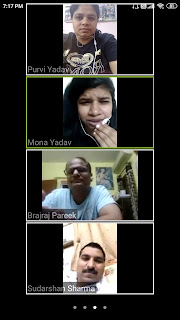“I
am not allowed to go anywhere near temple or worship place – touch or even see god
while I am on periods! It’s just not allowed, I asked my mom but she just
scolded me however offered no reason for it.”
We
had our second workshop on periods with adolescents as part of our ongoing
online gender, sexuality and reproductive health program. The session began
with a quick recap of our first session on ‘physical changes during adolescence;
it was joyful to watch participants respond quickly to mini question answer
series with eagerness!
After
going through agreements briefly, a sanitary pad was shown to the participants –
with a question – whether they have seen this thing somewhere? Do they know
what it is used for? To our surprise, one of the girls who usually seemed quiet
raised her hand to answer the questions.
We
then invited the group to share their experience of first periods – having big
red stain on a white skirt/clothing is the worst nightmare during the periods
which was experienced by the people in the group. One of them shared that along
with having periods without any information, the fact that ‘you are no longer a
child, you are a grown up’ whispered in hushed voices all around them which was
evident in the actions, conversations and everywhere in a subtle way was scary.
We
took this opportunity to build conversations on what, how and why of periods
with the use of pictures, cards and presentations giving scope for the
participants to ask questions as an when they wished.
The
way periods make entry into the lives of girls in India is not just as physical
change but carries a burden of social stigma, taboos, unwanted assumptions and
evidently impacting their self-worth. In the next part of the session, we
invited participants to share what all they have heard in terms of dos and don’ts
while being on periods
“Don’t pray to god or visit temples. Don’t
touch pickles. If by any chance I touch pickles, my mother would scold me so
much that I would think twice before touching the pickles even when I am not
periods. There are so many restrictions posed! I asked my mom many times as to
why I can’t do that – she just yells at me but never a reason was offered to me”
“I
love cycling, but when I am on periods – I am not allowed to ride my cycle,
play around or even jump. Swimming is not allowed, no entry into kitchen or
anywhere near worship area.”
One of the boys shared that he has never heard anything
of that sort, also he wasn’t much aware of what periods were before?
Another boy, “If there is any festivities, or some pious
work happening then girls are not allowed. They can’t go near worship area, or
cook food during auspicious occasion, worst I have heard they are also asked
not to speak to boys!”
Sahas
strongly believes that all these conversations around periods must include both
boys and girls. Many a times, these conversations are carried out exclusively
with the girls forgoing the basic fact that everyone co-habitat in the society
so keeping physical changes exclusively to one gender may not just raise
curiosity for others but may also lead to mockery, being used as an abuse and
stigmatization. Now what will boys do with information –
“There
are lot of young girls in my family and neighborhood- all this information is
not available. Nobody knows about periods. If girls know about this information
before they have periods or even during periods – it will be good and they won’t
be scared. I can share this information with them – let them know what they can
eat or what exercises they could do so that it will help with their pains. With
this information, young girls won’t freak out”
“We
can stop people from making fun or taking jabs on periods. So now I know about
periods and its importance so I won’t make fun and with that I will stop other
boys from making a joke out of it”
“I
can help my sister and mother during periods by helping in household chores and
can bring pad and other necessities from market. I can also speak to my sister
if she is comfortable talking about it”
In
the next part of the conversations, one of the facilitator shared her personal
experience of making a choice to take up a very difficult, strenuous yet very
crucial opportunity while being on periods. We also shared examples from the
sports person who no matter what situation are in play tournament. From very beginning
of life, girls are told what to do and
what not to do – and these restrictions only increases with physical changes
during adolescence like periods which not only limits their opportunities but
also restrict their capacity to do things the way they might wish to do. So the
primary objective of sharing these narratives was to debunk the myths, taboos,
stereotypes and illogical assumptions by providing evidence based examples
paving their path to fly as they want!
Every
time I facilitate these sessions – there is this tiny hope in me that the
periods won’t be like a nightmare for them as it is for most of the women
because they lack information and basic access to menstrual hygiene.
“When
you were talking about periods, my mother and sister were sitting in the same
room. It was awkward! I was feeling shy as to what would they think of me – I am
boy why would I be listening to all the things about periods – but by the end I
felt really confident and realized how crucial these information is. Didi, this
information must be provided to everyone. I can now talk about it with anyone
be it girls or boys making sure they are comfortable to talk about it.”













